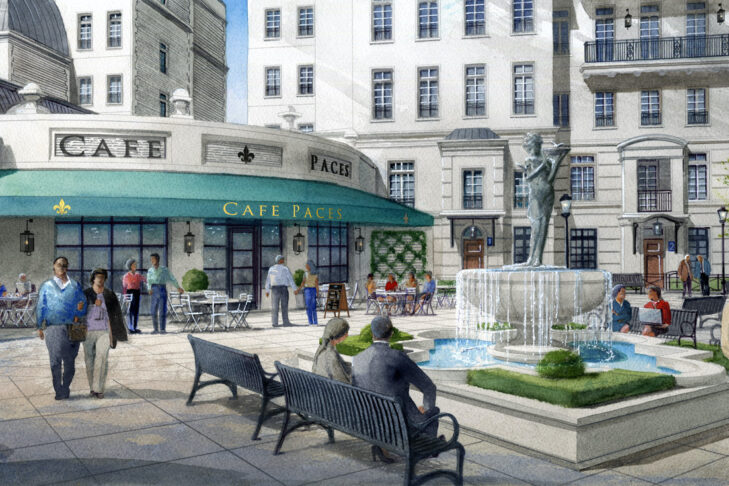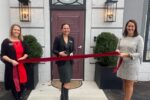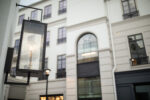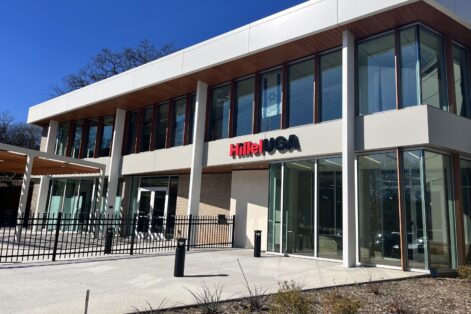Beneath Corso Atlanta’s curving lines and intimate social spaces is more than art. Using technology to measure how the built environment impacts behavior and wellbeing, parent company Galerie Living is developing wellness environments that promote physical, mental, and social health.
Led by Director of Design Steven Markey’s dedication to authenticity and beauty, Corso Atlanta’s neoclassical architecture has garnered attention and accolades from local and national organizations. While its architectural beauty is evident, the lesser-known theories and technology beneath Corso’s surface are equally as sophisticated.
Neuroartchitecture studies “the relationship between brain processes and architectural environments and their impact on the emotional and physical health of people”(1). With advancements in wearable and sensor technologies, neuroscientists and psychologists can study the immediate and long-term effects of the environment on mood, behavior, cognition, and more (2). Understanding the human impacts of the built environment is critical for designing intelligent spaces that promote people’s wellbeing.
Corso’s parent company, Galerie Living, embraces neuroarchitecture’s push to research environmental influences on health. Seeking to better understand the drivers of resident wellbeing and how to improve it, Galerie began working with a team of data analysts, neuroethicists, and developers in 2019. The team is currently developing an innovative platform called Fynn aimed at using real-time data to help residents live healthier, happier, and more independent lives. Based on research and 25 years of senior living experience, Galerie suspects the built environment plays a large role in residents’ mood, social connection, and resulting physical wellbeing. Fynn’s technology provides a proactive approach to wellness, new insights into what impacts behavior, and how behaviors may indicate changes in health.
Studies have shown architecture, art, and nature play major roles in the way people think, interact, and behave (3). Geometric angles, light, architectural variation, scale, and many other features affect mental stimulation, stress, social interactions, and even brain biology as reported in the BBC’s article “The hidden ways that architecture affects how you feel”.
Galerie Living uses these findings to design engaging environments for people of all ages while paying special attention to how seniors interact with spaces. Spaces that nudge social interaction while reducing stress are especially important for seniors’ wellbeing.
Older adults are at a significantly higher risk for social isolation (4). According to the CDC, “social isolation was associated with about a 50% increased risk of dementia and other serious medical conditions”(5). By designating 50% or more of a community to common spaces, Galerie campuses are intentionally designed to build social connection and a sense of belonging into everyday life.
One way Galerie does this is by eliminating hallways and replacing them with experiences.
For example, to reach residential spaces from Corso’s lobby, residents will walk through a cozy Bistro & Market filled with the scents of French pastries and a colorful selection of fine gifts and goods. The Bistro’s inviting atmosphere sparks exploration and natural conversation among residents. Rather than moving people through the campus in straight and uninterrupted lines, Galerie is weaving experiences like the Bistro throughout Corso.
Enriching social experiences like the one created by the Bistro are key to building supportive relationships and encouraging a physically and mentally active lifestyle.
In an interview with Bob Bahr of the Atlanta Jewish Times, CEO Tim Gary stated: “What we realized is that socialization [may be] just as important to someone’s health as their medication or the service levels that they may be receiving.”
He continued to explain designing wellness environments “takes good outdoor spaces; it takes good common spaces, and it takes the integration of all those spaces together.”
While spaces at Corso are designed to encourage social connection and a sense of belonging, an important part of the design is preserving the individual’s choice and control over their environment.
Along with building connective experiences, managing stress is especially important for seniors’ cognitive and physical health. Stress increases inflammation and has been linked to a number of “stress-related” diseases including Alzheimer’s disease, cardiovascular disease, and diabetes (6). Research shows curving lines and natural light, as seen throughout Corso’s curved and window-lined ceilings, can ease stress while sharp angles and closed rectangular rooms can increase stress. Calming blues and greens also reduce stress while warm reds in areas such as the lobby create energy (7).
Corso’s design also features a large number of arched windows facing the courtyards. These windows not only provide natural light and soft lines but another experience as residents enjoy the courtyard from a different perspective.
The windows also assist with wayfinding and orientation by giving transparency to how Corso spacially connects. Residents can look across the courtyard and know where they are in relation to the clock tower or Tea House.
The campus also incorporates nature and art to reduce stress and provide cognitive stimulation throughout destinations.
A large wallscape developed by Opiary, a Brooklyn-based biophilic design and production studio, is the first of its kind in the Southeast. The beautiful piece located in Corso’s Wine & Cheese Room is inspired by the Chattahoochee River’s curving path surrounded by North Georgia’s hills and mountains. Corso Atlanta may be located in the heart of West Paces but a connection to nature is far from lost.
In our next piece of “The Art (and Science) of Senior Living” series, CEO Tim Gary discusses the theories, tools, and people driving Galerie Living’s sophisticated senior living communities. Be sure to follow us on Facebook for Part II and more on Corso Atlanta’s innovative approach to creating inviting senior living communities.
This post has been contributed by a third party. The opinions, facts and any media content are presented solely by the author, and Atlanta Jewish Connector assumes no responsibility for them. Want to add your voice to the conversation? Publish your own post here.



















































